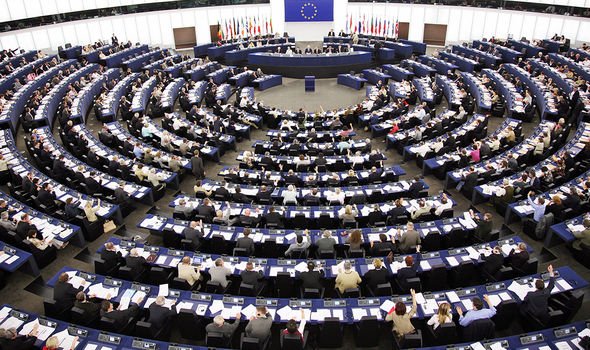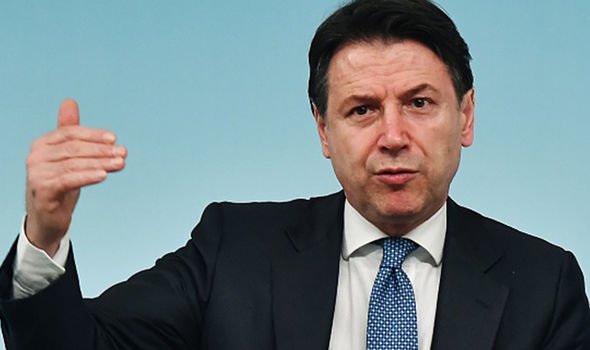As we are about to enter a new decade, the EU seems to be facing one of its worst existential crises since its inception. Euroscepticism is not something new. Ever since the efforts to achieve European integration started in the Fifties, political parties that made anti-integration their main platform started to mushroom throughout the continent.
The current pandemic, lockdown measures and the economic crisis looming seem to be exacerbating divisive trends in Europe.
For example, a recent poll shows that 67 percent of Italians believe that being a member of the bloc is a disadvantage for Italy.
If European leaders had listened to Ukip founder and LSE lecturer Alan Sked, though, things might be different today.
In the Eighties, the historian put forward a series of proposals that would have reformed the bloc and not led to the creation of a “bully superstate”.

Ukip founder reveals alternative to EU that could’ve stopped Brexit – but bloc ignored it (Image: GETTY)

The European Parliament (Image: GETTY)
Mr Sked, who was at the time a member of the Bruges Group – a think tank based in the UK which advocated for a restructuring of Britain’s relationship with the bloc – wrote a paper in 1987, before the Maastricht Treaty came into force.
In it, he acknowledged the European Economic Community (EEC) – the precursor to the EU – developed because European states recognised that there are certain areas in which they must work together.
However, he argued the existence of a federal supranational government should have been rejected as totally “unnecessary”.
He wrote: “European states are highly sophisticated organs which are already used to operating an enormous range of policies. They do not require supranational supervision.
“At the heart of these proposals therefore is the reform of the European Parliament in order to put an end to the centralising dynamic which it creates.
“In short, it is proposed that Europe should be run along with a parliamentary structure which established at the outset that sovereignty derives from the individual member states.
“This is, in my opinion, the only way to insert a protective shield between the freedom of the individual and the bureaucratic tendencies, already all too apparent in Brussels, which treats Europeans as identikit beings to be shaped according to institutional needs rather than personal desires.”
JUST IN: Brexit fury: Norway warned EU not to give UK ‘better deal’

Italian Prime Minister Giuseppe Conte (Image: GETTY)

Ukip founder Alan Sked (Image: LSE)
Mr Sked also suggested it was imperative that a European Parliament should exist to scrutinise the men and measures involved.
He noted: “Given the self-expanding powers of the Commission, the result is a democratic deficit at European and national level.
“It is therefore proposed to strengthen parliamentary accountability in the EC and to eliminate the democratic deficit by integrating the parliamentary process at national and Community levels.”
For example, Mr Sked proposed: “If a majority of any national delegation objects to legislation proposed in the European Cabinet on the grounds that it undermines a vital national interest, and find their objections sustained by a majority in their national parliament, the proposed legislation, even if passed, will not be applicable to the country concerned.”
Regarding the bloc’s budget, the academic added: “The European Parliament will not have the right to increase the EC budget without the consent of the EC Cabinet and Council.
“In order to ensure that member states contribute equitably, funds for the EC budget will derive from national quotas defined as an agreed proportion of national GDP.”
Moreover, Mr Sked envisioned a European commission with no political role.
DON’T MISS:
EU braced for bombshell Italexit as plot to leave in TWO years emerges [EXCLUSIVE]
Brexit fury: Theresa May negotiated UK into ‘disadvantageous’ place [ANALYSIS]
Leaked documents expose bloc’s attempt to control UK’s tax policies [REVEALED]

Former Prime Minister John Major (Image: GETTY)
He wrote: “The European Commission, though no longer retaining the right of initiative, will exercise the following responsibilities:
“To review legislative progress and to take member states to the European Court if they default on their obligations under the treaty of Union.
“The right to issue directives, to issue regulations, once they have been approved by the European Cabinet.
“The European Commission will cease to have any political role, and will not for example, function as the middlemen between the European Parliament and the European Cabinet.
“Given the increase in powers of the European Parliament, this will no longer be necessary. “
Mr Sked concluded the paper, arguing the advantages of these proposals were “manifold” and “logically consistent”.
He added: “The fact that members of the European Parliament and Cabinet will be functioning on both European and national levels would correct the democratic deficit.
“There will also be no rivalry between the European Parliament and the national parliaments.

Five key moments that led to Brexit (Image: GETTY)
“Finally, no single state could dominate others, or find itself contributing disproportionately financially.
“Secondly, inherent within these arrangements are both explicit and implicit safeguards against big government.”
In the early Nineties, when former Prime Minister John Major signed the Maastricht Treaty, Mr Sked changed his mind about the proposals.
He believed the bloc could have been reformed, but only if Maastricht had not come into force.
To this end, in 1993, Mr Sked set up a full-blown political party to campaign for withdrawal from the bloc: the UK Independence Party (Ukip).
In a letter addressed to Sir John found at the LSE library, Mr Sked accused Sir John of betraying Britain as Maastricht was “unconstitutional” and “had to be repealed”.
He said: “No government can constitutionally deprive the British people of its right to self-government.
“No parliament can constitutionally abdicate its authority to be the sole law-making body for the United Kingdom.
“No sovereign can constitutionally consent to deprive parliament of its sovereignty.
“The UK Independence Party therefore pledges itself to use all democratic means to oppose the three major parties and to restore to all British subjects of all colours and creeds their rights to democratic parliamentary self-government.”
When asked about his proposals in an exclusive interview with Express.co.uk, Mr Sked said: “When the Maastricht negotiations were taking place, the British government was desperate to have some sort of alternative
“And so the Bruges group asked me to do a Constitution for Europe that wouldn’t be federalist.
“All the members of the Bruges Group signed it.
“It was based upon the principle of national sovereignty.
“The British negotiating team in Maastricht was given a copy of it but Europe would have never agreed to it.”
He added: There is nothing you can do to reform Europe anymore.
“Whenever the Commission does something, they usually ask permission to the Germans.”







